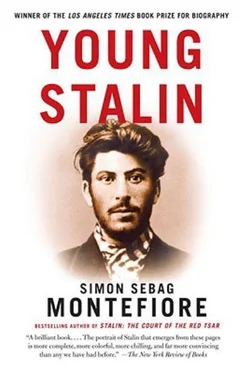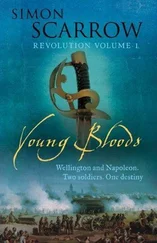“Look after the child,” he said, offering no help in paying for the family’s food. Beso, said Stalin, demanded that Keke take in laundry and send him the money. “How many nights did I spend in tears!” Keke remembers. “I didn’t dare cry in the child’s presence for it worried him so much.” Stalin “used to embrace me, peering fearfully into my face and say, ‘Mummy, don’t cry or I’ll cry too.’ So I’d control myself, laugh and kiss him. Then he’d ask again for a book.”
It was now, alone with a child, and with no support, that Keke became determined to send Soso to school, the first of either family to study. In her dreams, “I always wanted him to become a bishop because when a bishop visited from Tiflis, I couldn’t tear my eyes off him in admiration.” When Beso staggered back into her life again, he banned any such plan: “Over my dead body, Soso be educated!” They started to fight and “only the sound of my child crying separated us.”
Beso’s alcoholism undoubtedly made him pathologically jealous, but the rumours of infidelity and the wiles of a wife who overthrew his God-given power as a Georgian male, turning the town against him, must have contributed to his breakdown. Keke’s misery was indeed well known: Egnatashvili, Father Charkviani and the police chief Davrichewy did their bit to help her. Even Dato, the kind apprentice in Beso’s shop, reminded Stalin during the Second World War how he used to cuddle and protect him. On one occasion in the streets a Russian called the puny Soso a “locust.” Dato punched him and was arrested. But the judge laughed and the family protector, Egnatashvili, “paid for a feast for that Russian man.”
Keke’s life was falling apart. The business was failing, and even Dato left to set up his own cobbler’s shop. [12]“When I was ten,” Stalin recounted in 1938, “my father lost everything and became a proletarian. He swore all the time about his bad luck,” but, he joked, “he became a proletarian so his ruin was my advantage! When I was ten, I wasn’t happy he’d lost everything!”
Davrichewy employed Keke to do housework. She became the laundress for the Egnatashvilis: she was always in their house, where Soso would often have his dinner. It is clear from Keke’s memoirs that Egnatashvili loved Soso, as did his wife, Mariam, who gave them baskets of food. If there had not been an earlier affair with Egnatashvili, there surely was now. “The family survived only with his help,” says Keke. “He always helped us and he had his own family… and to tell the truth, I felt uneasy.”
The priest also supported her plan to educate Soso and she asked the Charkvianis to let their teenage sons teach him Russian with their younger children. She sensed that Soso was gifted. The teenage boys were teaching their younger sister, who could not answer their questions—but young Stalin could. Stalin boasted as an old man that he had learned to read and write faster than the older children: he ended up teaching the teenagers. “It had to be top secret,” says Father Charkviani’s son Kote, “because Uncle Beso was getting worse daily, threatening, ‘Don’t ruin my son or else!’ He’d drag Soso by the ear to the workshop, but as soon as his father went out, Soso joined us, we locked the door and studied.” The Davrichewys let him share their son’s lessons too.
Such was the charm of Keke and the horror of Beso that everyone wanted to help her. Now she had to inveigle Soso into Gori’s excellent church school so that he could become a bishop. She made several attempts. But the school was taking only the children of priests. Father Charkviani solved this problem by saying that Soso’s father was a deacon, but this appears in none of the documents. One wonders if he actually whispered to the school authorities that he himself or some other sinful priest was the natural father. Was it this chicanery that made Stalin claim that his father was a priest?
Soso sat the examination—prayers, reading, arithmetic and Russian—and his performance was so outstanding that the church school accepted him into the second grade. “My happiness was endless,” said Keke, but Beso, who could no longer work, “was infuriated.” {38}
Crazy Beso smashed the windows of Egnatashvili’s tavern. When Keke grumbled to Davrichewy, Beso attacked the policeman, stabbing him in the street with a cobbler’s tool. Ironically, Mayor Jourouli presented this as proof that the policeman was Soso’s father. But Davrichewy did not arrest Crazy Beso. According to his son, the police officer’s wound was minor, and he had had some sort of relationship with the “very pretty” Keke: he always “took a special interest in Soso.” Davrichewy merely ordered Beso to leave Gori, whereupon he took a job at the Adelkhanov Shoe Factory in Tiflis where he had started out. Sometimes Beso missed his son and sent Keke money, asking for a reconciliation. Keke agreed occasionally, but it never worked.
Stalin’s father had lost the respect due to him as a man, let alone as a karachogeli . In the honour-and-shame society of Georgia, this was a sort of death. “He was a half-man now,” said Keke, and this pushed him over the edge. For the moment, he was gone, but he was never far away. {39}
Keke got a proper job at the atelier of the Kulijanav sisters, who had just opened a lady’s couture shop in Gori. Keke worked there for seventeen years. Now that she earned her own money, she tried to “make sure my child’s heart didn’t wither with sorrow—I gave him everything necessary.”
She brought him up to be the Georgian knight, an ideal he transferred to himself as a knight of the working class. “A strong person,” he wrote to her in her old age, “must always be valiant.” He believed that he resembled Keke more than Beso. Stalin “loved her,” said his daughter, Svetlana, “and he loved to talk about her though she beat him mercilessly. All the love Father had was for me and he told me it was because I looked like his mother.” Yet he began to pull away from Keke.
Stalin “did not love his mother,” claims Beria’s son; others, mainly Georgians, swear he called her “whore.” But these were often stories to dehumanize Stalin told by his enemies. Psychiatrists suggest he was confused by Keke’s combination of virgin and whore, which may have made him suspicious of sexual women later in life.
Was he shocked by Keke’s earthiness? Did he disapprove of her male protectors? Certainly he became prudish later, but so do many people as they get older. All we know for sure is that he was raised in a rigid, hypocritical and macho culture—yet his sexual morals as a young revolutionary were easygoing, almost liberated.
Soso was “devoted to only one person—his mother,” according to Iremashvili, who knew them both well—and is a hostile witness. But the more likely reason for the growing distance between them was her sarcastic outspokenness—she “never hesitated to voice her opinion on everything,” reports Beria’s son—and her domineering drive to control his life. Her love—just as his would be for his own children and friends—was suffocating and severe. Mother and son were rather similar, and there lay the problem.
Yet in his own way he appreciated her intense love. During the Second World War, he laughed fondly about Keke mollycoddling him, telling Marshal Zhukov that she “never let him out of her sight until he was six.” {40}
In late 1888, at the age of ten, Soso triumphantly enrolled at the Gori Church School, [13]a handsome two-storey redbrick building near the new station. Poor as she was, Keke was determined that her Soso would not stand out for his poverty among the well-off sons of priests. On the contrary, he would be positively the best-dressed pupil in the whole school of 150 boys.
Читать дальше












